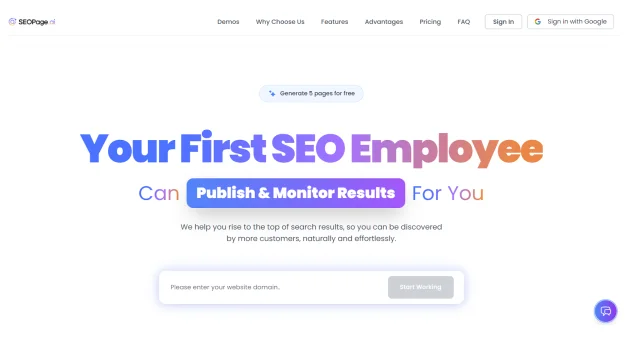The SEO tool market is saturated with options. Most fall into predictable categories, audit platforms that list endless technical issues, or content generators churning out generic 2,500-word blog posts that say nothing useful.
SeoPage.ai breaks from this pattern by focusing on something different: building pages specifically designed to convert. Not just rank, not just attract traffic, actually convert visitors into customers.
Let’s explore what this platform does, who it’s for, and whether it lives up to its promises.
What SeoPage.ai Actually Does
SeoPage.ai is an AI-powered platform that generates specific types of SEO pages designed for high commercial intent. Instead of creating generic content, it builds structured pages that target users actively making purchasing decisions.
The platform specializes in five key page types:
- Alternative pages
- Best Of pages
- Solution-focused landing pages
- FAQ pages
- Testimonial pages
These aren’t random selections. Each page type corresponds to specific stages in the buyer journey where users are closest to conversion. Someone searching “Apollo alternatives” isn’t casually browsing, they’re evaluating options right now, which makes these high-value keywords to target.
Why the Focus on Conversion Pages Makes Sense
Traffic and rankings matter, but conversions drive business results. Many websites generate decent traffic from blog content without seeing proportional growth in sales, sign-ups, or leads.
The pages SeoPage.ai creates target bottom-of-funnel searches, queries from users who understand their problem and are evaluating solutions. These pages capture traffic that’s far more likely to convert than informational blog readers.
Take alternative pages as an example. In competitive SaaS markets, searches for “[competitor] alternatives” represent users actively looking to switch tools. They’re comparing options, evaluating features, and ready to make decisions. A well-optimized alternative page positions your solution at exactly the right moment.
Building these pages manually is resource-intensive. Each requires competitor research, structured comparisons, optimized copy, relevant images, and strategic internal linking. For a single page, this can take 6-8 hours. Scaling to dozens of pages becomes prohibitive for most teams.
How the Platform Works
The workflow is designed to be accessible without requiring deep technical expertise.
After entering your website domain, the AI analyzes your site, niche, and competitive landscape. It identifies your main competitors and the types of pages that would capture relevant high-intent traffic.
The platform then generates a sitemap blueprint—a strategic roadmap of pages to build based on opportunities in your market. Users can adjust these suggestions or approve them as-is.
Once approved, the AI builds complete pages including optimized content structure, headings, internal links, and images. Each page is constructed following Google’s E-E-A-T principles (Experience, Expertise, Authoritativeness, Trustworthiness), which have become increasingly important for rankings.
Pages can be reviewed, edited if needed, and published directly to your domain. The process typically takes 10-15 minutes per page from creation to publication.
Understanding the Core Page Types
Each page type serves a specific strategic purpose.
Alternative Pages
These target commercial searches where users are explicitly seeking alternatives to existing solutions. The intent is clear, these searchers are dissatisfied with current options or comparing before committing.
Effective alternative pages don’t just list competitors. They address specific pain points that drive users to seek alternatives, demonstrate how your solution solves those problems, and provide clear next steps.
Comparison Pages
Broader than alternative pages, comparison content can pit your product against multiple competitors or focus on specific feature sets across different tools.
The key to successful comparison pages is honest assessment. Overly promotional content fails to build trust. Showing where you excel while acknowledging scenarios where competitors might be better fits actually increases credibility and conversions.
Solution-Focused Pages
These target specific use cases or industry verticals. Instead of generic feature descriptions, they speak directly to particular audience segments.
For example, rather than a broad “Features” page, create “Project Management for Marketing Agencies” or “CRM for Real Estate Teams.” This specificity dramatically increases relevance and conversion rates for targeted searches.
FAQ Pages
Well-executed FAQ pages address real questions users ask during evaluation. They overcome objections, provide clarification, and move prospects toward decisions.
Poor FAQ pages (most of them) are just repositories for questions nobody actually asks. SeoPage.ai builds FAQ content based on actual search queries and common concerns in your niche.
Testimonial Pages
Social proof significantly influences purchasing decisions. Structured, searchable testimonial pages can rank for “[product] reviews” and similar evaluation-phase queries.
These pages capture users specifically seeking validation before making commitments.
What Differentiates This from Other AI Writing Tools
Generic AI content tools like Jasper or Copy.ai work well for generating blog content and marketing copy. They provide blank canvases and ask users to define exactly what they want to create.
SeoPage.ai takes an opinionated approach. It has built-in frameworks for each page type based on structures proven to convert. Users aren’t starting from scratch, they’re leveraging templates optimized through testing across thousands of pages.
This is particularly valuable for teams without dedicated SEO or copywriting expertise. The strategic thinking about structure, positioning, and optimization is built into the tool.
For a more technical analysis of features and specific use cases, there’s a comprehensive review on Ecommerce Fast Lane that goes deeper into functionality and testing results.
Strengths and Limitations
No tool works perfectly for every situation. Understanding where SeoPage.ai excels and where it doesn’t help determine fit.
Where It Excels:
Scaling high-intent pages efficiently. For teams needing multiple alternative pages, comparison pages, and solution-focused content, this dramatically reduces production time and cost compared to hiring writers or building pages manually.
Maintaining consistency across similar pages. When creating 20+ alternative pages, keeping quality and structure consistent is challenging. The AI handles this naturally.
Speed of execution. Pages that would take days to research, write, and optimize manually can be created in minutes.
Where It Falls Short:
Long-form educational content. The platform isn’t designed for 3,500-word thought leadership pieces or detailed industry analysis. It focuses specifically on conversion pages.
Highly specific brand voice. While pages are professional and clear, matching a very distinctive brand voice (extremely casual, highly technical, etc.) requires manual editing.
The platform solves a specific problem exceptionally well. For other content needs, different tools are better suited.
Who Benefits Most
Based on typical use cases, several types of teams see the most value:
SaaS Companies in Competitive Markets: Need alternative pages for every major competitor. Building these manually is prohibitively time-consuming. This tool makes comprehensive coverage manageable.
Digital Agencies: Managing multiple clients requires producing significant content volume. The ability to rapidly generate conversion-focused pages for different clients without scaling team size is valuable.
Small Teams with Limited Resources: Can’t afford dedicated content teams but need to compete with larger companies. This levels the playing field considerably.
Anyone Running Competitive SEO Campaigns: Targeting “[competitor] alternative” keywords systematically requires building many pages. This tool makes that strategy feasible.
Real-World Results
Actual performance matters more than features. Based on available data and third-party testing, pages built with SeoPage.ai are achieving rankings and driving conversions.
Pages typically reach top 10 positions for target keywords within several weeks to a few months—standard SEO timelines, not overnight miracles. More importantly, conversion rates on these pages often exceed typical blog content by significant margins, with some users reporting 5-8% conversion rates on alternative pages.
Daniel Dann from the “Daniel | Tech & Data” YouTube channel conducted extensive testing and shared detailed review that demonstrate real-world performance across multiple page types and industries.
Professional Assessment
SeoPage.ai isn’t attempting to be an all-in-one solution. It solves one specific problem: helping teams efficiently build conversion-focused SEO pages at scale.
For that specific use case, it performs well. Pages require review and occasional editing. The AI sometimes makes assumptions that need correction, and tone adjustments help match specific brand voices. But as a productivity tool for creating high-intent pages, it’s the most effective option currently available for this particular job.
The key is understanding its intended use. Teams needing blog content, creative storytelling, or technical documentation should look elsewhere. But for alternative pages, comparison content, and solution-focused landing pages that rank and convert, the tool delivers genuine value.
Is It Worth Considering?
That depends entirely on your specific needs.
If you’re in a competitive market without pages targeting “[competitor] alternative” searches, you’re missing opportunities to capture high-intent traffic. Those searches represent users actively evaluating options—exactly the audience you want to reach.
If current content generates traffic without proportional conversions, focusing on page types specifically designed to convert may be more strategic than continuing to produce more top-of-funnel content.
If you’re a small team competing against companies with large content operations, tools that enable efficient production of high-converting pages help level the playing field. You can’t match their volume, but you can match their strategic coverage of high-value keywords.
Most platforms offer trials or demos. Testing with a few pages and measuring their ranking and conversion performance is the only definitive way to assess fit for your specific situation.
Bottom Line
SEO tools succeed when they solve real problems efficiently. SeoPage.ai focuses on one specific challenge, building conversion-oriented pages quickly while maintaining the quality and structure necessary to rank and convert.
In a landscape dominated by audit tools and generic content generators, a platform focused specifically on high-intent, conversion-optimized pages fills a genuine gap.
The value proposition is straightforward: if you need alternative pages, comparison pages, and solution-focused content that drives conversions, this tool builds them faster and more affordably than traditional methods while maintaining competitive quality.
For teams serious about capturing and converting high-intent traffic, it’s worth serious evaluation.



